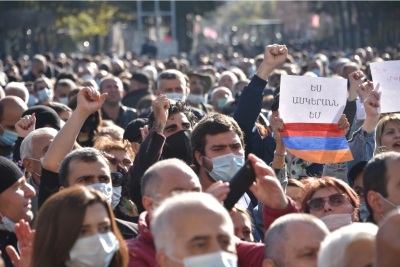War-torn Armenia puts heavy weight on churches
The conflict continues to rage in Armenia that has taken the lives of many soldiers and displaced over 100,000 people. All the while, the world keeps silent and prefers not to know about it. On Nov 10th a Russia-brokered peace deal has been agreed between Armenia and Azerbaijan. It brought to an end six weeks of war in which thousands of people were killed and displaced.

I just came back from Armenia and want to emphasize some basic facts about what is happening in this small and remote country.
First of all, we should acknowledge that although hostilities have ended with a ceasefire agreement, the humanitarian crisis is only getting worse. The terms of the peace are such that Armenia loses almost everything and people have nowhere to return to. Moreover, Armenia itself is completely under Russian control. This means that all Western and international organizations can face big problems. Protests against surrender are growing, and chaos is growing in the country.
Secondly, in these conditions, the role of the Church increases. People just have nowhere else to go. The church becomes the only place where people can be helped.
Thirdly, the Church is ready to help people but the Church itself needs help. Evangelical churches of Armenia are very active but they are not and cannot be ready for such high numbers of refugees. Today is our chance to show Christian solidarity and help the Armenian Evangelical Church fulfill its mission in this difficult time. “Help us to help our people”, ask local pastors.
On my recent trip to Armenia (Oct 29th – Nov 7th) I had an opportunity to visit 12 evangelical churches and meet with many church ministers. I heard it everywhere that Christians are also on the frontlines, on their very special front – the front of caring for those who have been affected by the conflict.
For a small Christian nation the conflict is not an issue of the territory, it’s of their survival. Refugees suffer because of lack of bread, roof over their heads, medicine and doctors’ help. Apart from that, the pandemic crisis is worsening. With all that happening, the churches have become the beacons of hope for scared and suffering people. They don’t do services on Sundays because of the coronavirus but they continue serving refugees every day sharing their bread and their homes as well as words of comfort and hope. Even before the war, more than 32% of the population lived below the poverty line. Now with the conflict raging on, these alarming rates are growing every day.
Asatur Nahapetyan, pastor and general secretary of the Baptist Union of Armenia, anticipates this conflict to linger and asks everyone to get ready for a hard winter. Over 100 families from Karabakh have been placed by Baptists in their homes and 42 people were accommodated in a conference hall in Razdan.
According to Suren, a pastor of a small Baptist church in Ararat, not only conference centers but many churches open their doors to welcome refugees. Due to quarantine, many church buildings are closed for attending services and are now used for taking in refugees.
The church with a symbolic name Noah’s Ark (in Ararat) is providing shelter for 40 people. At first, they were really afraid of Christians regarding them as sectarians but now they don’t want to leave. Pastor Araik says that people from Karabakh are not very religious and many of them still retain the Soviet spirit, but there are no atheists in trenches.
The church in Ararat has 700 members. They all minister to refugees as one strong united team. “It’s the only place where we are welcomed,” say women refugees – who didn’t want to know anything about God just yesterday – about the evangelical church. They learned to pray in the church and their husbands who are on the front lines call their wives, “We didn’t believe in God but it was your prayers that kept us safe.” Women and children say to their pastor often, “When you pray we sleep well and we stop having nightmares.” Everyone lives on prayers here.
It all started on the first day of war when the pastor called the mayor’s office and said that the church was ready to take in refugees. It’s been filled with people since then.
It’s important to understand that the church prepared themselves for this ministry even before. The pastor says that successful work with young people changed the way the society viewed the church. “We fed 40 people every Saturday and took hot lunches to 20 families even before the war. Everyone knows us as the ark of hope and salvation. For people, we are not just a religious organization but a charitable organization. But the Apostolic church is just religious to them. Although it’s interesting to see how the state church starts to imitate us. Priest David started doing what we do – preaching the Gospel, visiting people in their homes, meeting them and talking to them. Even the police say to people, 'contact the church; they’ll help you there.' Everyone respects us now.”
Pastor Vazgen from the church in Abovyan says something similar: “Almost all the refugees that we received in our church have made a decision to follow Jesus.”
The church in Artashat is also filled with refugees and it’s also filled with the spirit of hope. Nune arrived from Stepanakert last night and is still in shock but firmly says, “We are doing well while we are at the church.” A boy is standing right next to her. His name is David and he is from Shushi. He also arrived last night. When we prayed and sang he held his hand up all 30 minutes sending prayers to God. I think that all these events make the refugees of Karabakh the people of prayer and faith. When I timidly asked Khaspik who lost her son (the other son together with her husband were still fighting in Karabakh) if I could pray for her she firmly nodded her head. A day later I learned that not only her but all the other refugees who were living in the former cowshed in Abovyan, accepted Christ.
People are very traumatized yet at the same time they are very open. The families of refugees open their doors and invite us to come in and eagerly bow their heads in prayer. In one of the old half destroyed homes in Vanadzor where two families were sharing a small space, I noticed a New Testament at the center of the room on a stand that was given to them by our SWW students. The family have lost their loved ones and the children were sick. When I showed the Gospel and said that it was the most important book in life that saved me and could save them, they nodded in agreement. Then we prayed together.
Local churches are very active in reaching out and working with refugees but their personal resources are running low. That’s why it’s so important for the involvement of international partnerships. “It’s important for us to know that our brothers and sisters from other countries suffer together with us as one body,” says pastor Haik from Vanadzor.
There is another need and that is to prepare the church leaders to this ministry. As pastor Vazgen notes, “Young evangelical churches don’t have a system to train leaders. Everything is just starting. Many are willing to serve but they need to be trained first.”
Pastor Artur Simonyan says that mentoring will become the main need that will have to be met after the critical phase of the conflict as many thousands of victims of war will need the healing. “If you can develop a resource for counselling people with war traumas you will greatly help the local church.”
For now, the flow of refugees is steadily increasing. Here is one of the thousands of stories of families who fled Karabakh.
Lucine was baking bread when a mortar landed on their house. Fortunately, it didn’t explode. Together with her seven children, pregnant Lucine climbed out of the window and ran barefoot to the nearest village. “God saved us,” she said, “although it was hard. We lived outside under the open sky for two weeks waking up with our skin blue from cold. The last few days we lived in an old military trailer.”
When asked what she wants for her children Lucine answers confidently, “for them to study well.”
Her husband stayed behind fighting in the war. Her mother-in-law, Lola, the grandmother of 26 grandchildren helps Lucine with the children.
Lola is tightly holding the Bible that was given to her and says, “They asked me how they could help. I asked for a Bible. It’s been my dream to read the Bible since I was a child.”
While evangelical churches of Armenia are serving their people we have an opportunity, even responsibility to think about this ancient Christian nation, pray for them and extend our helping hand. It’s our common second front, but in terms of importance, it’s ranked first. Let’s help Armenian Christians to help their nation.
Dr. Michael (Mykhailo) Cherenkov serves as the executive field director of Mission Eurasia. He is also the author of seven essay collections and five books on evangelical Protestantism, and he is the co-author (with Dr. Joshua T. Searle) of A Future and a Hope: Mission, Theological Education and the Transformation of Post-Soviet Society.



























